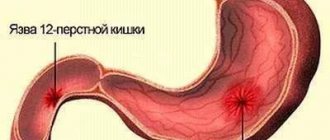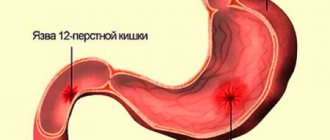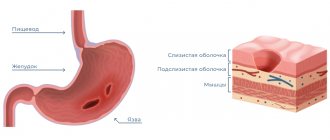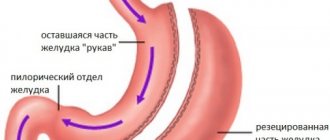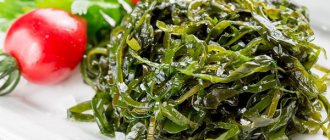As you know, a stomach ulcer is one of those diseases that can “shoot” at any time and lead to the most disastrous consequences. However, despite this, most patients, barely coping with the disease, return to their addictions, namely, alcohol abuse. Moreover, some of them claim that it was alcohol that helped them cope with the disease by accelerating the scarring of ulcerated mucous membranes.
Is it really? Is it possible to drink alcohol if you have a stomach ulcer and, if so, what kind? What and in what volume can you drink so as not to harm the gastric mucosa and not disrupt the course of treatment? Let's try to figure out these questions.
Content:
- Function of the digestive system
- Drinking alcohol for stomach ulcers
- What alcohol can you drink if you have a stomach ulcer 3.1. Vodka 3.2. Beer 3.3. Dry red wines 3.4. Cognac
There are almost more ways to cure this disease in alternative medicine than there are recipes for colds. In addition, traditionally, ordinary people try to treat almost all diseases with vodka, so when asked whether you can drink alcohol if you have a stomach ulcer, you will most likely be answered in the affirmative. And they will give you a bunch of “useful” tips, following which you won’t be far from the operating table. Is there at least some truth in the recommendations of traditional healers? Let's look for an answer from experts who rely on scientific data and professional experience, and not on the popular love for strong drinks.
What do doctors think about treating peptic ulcers with alcohol?
Gastroenterologists involved in the treatment of stomach ulcers are unanimous in their decision - drinking alcohol in this disease is strictly prohibited. Why? Everything is quite simple.
- Firstly, alcohol consumption leads to the development of inflammatory processes in the walls of the stomach.
- Secondly, even low-alcohol drinks, such as beer or wine, can lead to increased acidity of gastric juice and disruption of digestive processes.
- Thirdly, alcoholic drinks consumed against the background of a stomach ulcer can provoke the development of an acute attack of the disease, accompanied by internal bleeding, which can result in the death of the patient.
Therefore, despite the fact that many patients do not agree with the opinion of doctors, it is still not worth the risk to risk your own life and drink alcohol while suffering from a stomach ulcer and undergoing appropriate treatment.
Function of the digestive system
The process of processing food in the stomach begins with the production of gastric juice (hydrochloric acid as its main component) and a special enzyme, pepsin. To protect the organ, its walls are protected by a thick layer of mucus. In a healthy person, it is so reliable that the active substances for digesting food pieces simply cannot get through it.
Poor nutrition, nervous disorders, bad habits and other factors disrupt it, the mucous membrane becomes thinner and destroyed, and through it, hydrochloric acid penetrates the walls of the stomach, corroding them with the formation of bleeding ulcers.
The entry of alcohol into the stomach causes an increase in secretion, and there is more hydrochloric acid than is needed for digestion. Its excess destroys the protective layer, but since it is quite thick, without damage, and mucus production occurs constantly, short-term exposure to the wrong foods and liquids does not cause significant harm to a healthy body, and recovery occurs quite quickly.
Drinking alcohol for stomach ulcers
Ethanol entering a diseased organ also provokes the formation of excess HCl, which, penetrating through the damaged protective barrier of mucus, corrodes the already ulcerated walls, aggravating the painful condition. When it gets into existing lesions, it “gnaws holes” right through - perforation and bleeding threaten not only deterioration of health, but also a risk to life.
Ethyl alcohol, in addition to its destructive effect on the entire body, primarily affects the gastrointestinal tract and, if they are not healthy, aggravates the condition.
Why do people's councils suggest treating illness with vodka? Why does a strong drink taken orally really soothe pain? The thing is that the subsidence of painful symptoms is only the effect of ethyl toxins: they block the work of nerve impulses that transmit information to the brain. Without receiving it from the organ, the brain “considers” it healthy and does not take any steps towards its regeneration and restoration of the protective layer, allowing the destruction of the gastric walls.
When the ethanol effect stops, the body “comes to its senses” and the person feels a sharp deterioration in well-being. It started earlier, but the pain was drowned out, like anesthesia, by alcoholic toxins.
Remember: peptic ulcer disease and alcohol are incompatible! Even a small dose of alcohol-containing drinks can lead to perforation of the ulcer and bleeding. By violating a medical prohibition, each time an ulcer sufferer puts his life at risk.
The negative impact of “hot” drinks on the diseased gastrointestinal tract and the body as a whole is obvious:
- under the influence of ethyl alcohol, the production of hydrochloric acid increases, which corrodes the gastric walls, affecting healthy cells and aggravating the condition of patients;
- Digestion worsens, provoking inflammatory and putrefactive processes;
- metabolism is disrupted, leading to constant constipation and then to its chronic form;
- immunity decreases;
- the risk of perforation, bleeding, and then, with untimely assistance, peritonitis increases sharply;
- Regular consumption of alcohol-containing products provokes the development of cancer cells; the prognosis for oncology treatment is unfavorable.
Undeniable harm
The therapeutic effect of wine appears only if the daily dose does not exceed 30 ml in terms of pure alcohol, which is no more than 300-350 ml per day for a man, and no more than 150-200 ml for a woman.
That is, for the weaker sex - no more than a glass of wine. In larger doses, the drink is harmful: tannin causes severe headaches; Alcohol negatively affects the functioning of the liver, causes pressure surges, can cause the development of hypertension, osteoporosis, and increases the risk of developing cancer.
For ulcerative lesions of the gastrointestinal tract, coronary heart disease, as well as pancreatitis, liver cirrhosis and depression, drinking red wine will only cause harm, and is therefore completely contraindicated.
What alcohol can you drink if you have a stomach ulcer?
In short - none. But, given the nationwide love of Russians for alcoholic fun, it is difficult to imagine that this ban will be strictly observed by all ulcer drinkers. Based on the famous: “If you can’t, but really want to, then you can,” we will highlight the most categorical restrictions, observing which, you can minimize the harm.
First, you need to strictly understand: it is unacceptable to take any type of alcohol during the acute stage of the disease: only during remission, little by little, after meals and with a good snack. Excess HCl, which appears when the ulcer person drinks, should be used to process food without injuring the stomach. This also explains the advice that if pain occurs, you should eat mild and unsalted food: preferably semi-liquid porridge. On the one hand, porridges have an enveloping effect and serve as additional protection for the damaged gastric body, and on the other hand, they give digestive enzymes work, directing them “in the right direction,” preventing “distraction from the main work” and harming health.
You should follow the rules of drinking not only during illness, but also when drinking alcohol after a stomach ulcer. Ulcer sufferers are strictly prohibited from:
- Champagne, sparkling and other carbonated wines.
- Sour table, dry and fortified wine products.
- Multi-ingredient cocktails, gin and tonics.
- Liqueurs and martinis.
But what is possible? Conditionally permitted includes, first of all, vodka, beloved by many. But in moderation, “a little bit” and at a certain time.
Vodka
No matter who advises, it is strictly contraindicated to drink during an exacerbation of the disease.
Contrary to false beliefs, like any other product, forty degrees can in no way be considered a medicine for scarring ulcers. Unfortunately, many ulcer sufferers who have considerable alcohol experience think so. And some doctors sometimes advise taking a shot glass to relieve pain. Let's leave unprofessional advice to the conscience of the half-educated: the blocking effect of ethyl toxins can lead to the fact that, stunned by ethanol, the patient will not feel a sharp deterioration in his condition, and even the most ambulance will not have time to take him to the operating table. To prevent a pleasant feast from turning into disaster, follow the recommendations:
- drink no more than once or twice every six months, no more than 50-70 ml, based on the content of pure alcohol in the total amount drunk. The dose depends on the age, health status, weight and gender of the patient;
- observe an alcohol break in spring and autumn: during this period the disease usually worsens;
- It is better to start a drunken feast after lunch, in the late afternoon, since at this time all the physical and chemical processes of the body slow down, including gastric secretion;
You should drink not before snacks, but between them. Eat first, and only then raise your glass, so vodka will cause less harm to your body.
Beer
It is harmful even to a healthy person. Even without the alcoholic component, its composition contains enough components that are harmful to the health of the ulcer. Hop bitterness, succinic and acetic acids in foam activate the production of gastric juice more strongly than ethyl alcohol. Increased secretory gastric function leads to heartburn, belching, bloating, and causes increased gas formation and putrefaction processes in the gastrointestinal tract.
The chemical composition of beer provokes a sharp surge in insulin and a feeling of hunger. Therefore, harmful snacks are used: salted and smoked foods, flavored with hot seasonings.
A weak degree does not exclude a negative influence, but, using the magic: “If you can’t, but you want to,” you can afford an occasional glass of beer, but, again, observing the conditions: only sometimes, no more than once every one or two weeks, and not more than a couple of glasses, and choosing non-bitter and low-alcohol varieties. And, of course, with a suitable snack.
Red wines
Professionals have a complex attitude towards this type of alcohol-containing products. Some believe that a glass will not hurt, others (and they are worth listening to) believe that a wine product increases acidity and aggravates the effect of alcohol. Sour wines can cause nausea, vomiting, and bleeding.
The claims that Kindzmarauli or Cabernet inhibit the action of the Helicobacter bacterium, which is responsible for the development of the disease, are very doubtful. Even a strong drink cannot suppress its activity, so completely different medications are used.
So, lovers of a wine feast must make a decision, being aware of all the risks of relapse and general harm to the body.
Cognac
Noble Armagnac has the same effect as vodka, moonshine and all other alcohol, regardless of aristocracy. Therefore, it has no advantages over other alcohol-containing drinks. Its fans claim that tannins help increase blood clotting, but if the ulcer is already bleeding, you need to think not about the feast, but about how to quickly get to professional medicine.
Of course, everyone makes their own decision to drink or not drink. Peptic ulcer disease and alcohol are incompatible by definition. And this is without taking into account the harm caused to the body as a whole.
Alcohol is harmful and dangerous to health even in “cultural” doses, because it is not for nothing that, according to WHO, it is one of the most dangerous drugs, ahead of heroin in danger and second only to tobacco.
Consequences and complications
Peptic ulcer disease at any stage and alcohol are incompatible; if a person continues to constantly violate the specialist’s instructions and the treatment regimen by drinking alcohol, then the consequences will be the most dire. Once in the body, ethanol has a strong irritating effect on the mucous membranes and tissues, causing serious deterioration. Even small doses taken systematically can lead to gastric perforation, severe bleeding or the formation of a cancerous tumor. All of them are extremely difficult to treat; a perforation or tumor, if left untreated, in most cases leads to death.
Complications can be the most dangerous and often unpredictable. Doctors do not recommend drinking even “medicinal” doses of alcohol - a small amount of good vodka can relieve pain, but will have an extremely negative effect on the mucous membrane. The negative effect of alcohol on the stomach is shown in the video
https://youtube.com/watch?v=EEQMIcwoYKQ
Literature:
- Trukhan D.I., Tarasova L.V., Filimonov S.N., Viktorova I.A. Diseases of the esophagus, stomach and duodenum. Clinic, diagnosis and treatment: textbook: for the system of postgraduate and additional education of doctors - St. Petersburg: SpetsLit, 2014. - 157 p.
- Trukhan D.I., Viktorova I.A. Gastroenterology. Internal diseases: a textbook for students studying in the specialty 06010165 - General Medicine and 06010365 - Pediatrics - St. Petersburg: SpetsLit, 2013. - 367 p.
- Baranskaya E.K. et al. Gastroenterology: Handbook - M.: Rus. doctor, 1998. - 95 p.
Before and after IVF
Thus, we can conclude: in small doses, at dinner, dry red wine can be consumed and even beneficial in preparation for the protocol. In the IVF program itself, it is undesirable to take alcoholic beverages: during hormonal stimulation, the load on the liver increases significantly, and additional stress factors in the form of the need to process alcohol in the liver at this moment are completely unnecessary.
Well, after the transfer, do not forget that you should behave as a pregnant woman should. And the first rule during pregnancy is that alcohol is strictly contraindicated!
Sources:
* https://regnum.ru/news/2333647.html
** https://ndb.nal.usda.gov/


